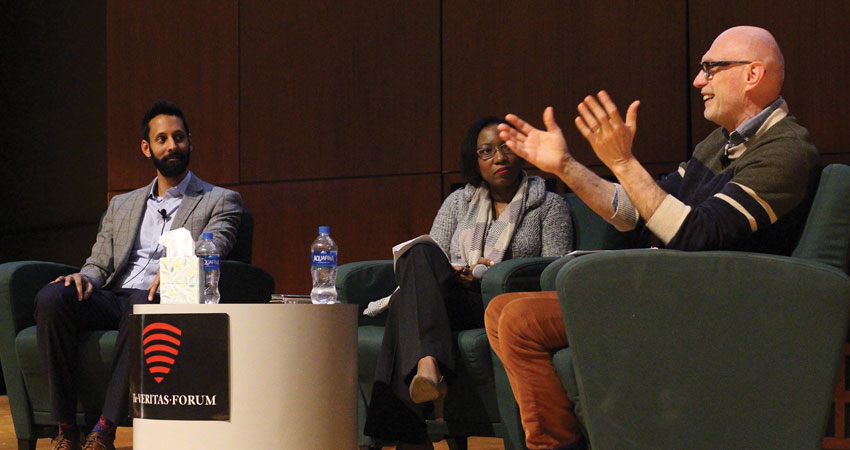Veritas Forum Features Volf, Dean of Students
By Zachary Lee, Cornell ’20
In March, the Veritas Forum at Cornell University posed the question Can Truth and Tolerance Co-Exist?
Dr. Miroslav Volf, director of the Yale Center for Faith and Culture, and Dr. Vijay Pendakur, Dean of Students at Cornell, addressed that imposing inquiry, while Dr. Ludmilla Aristilde, an associate professor in the Department of Biological and Environmental Engineering, facilitated the discussion.
Dr. Miroslav Volf, director of the Yale Center for Faith and Culture (right), and Vijay Pendakur, Cornell Dean of Students, tackled the question of whether truth and tolerance can co-exist.
Volf and Pendakur first spoke about their respective childhoods and how these experiences shaped their interests in the intersection of truth and tolerance. Volf grew up as a Pentecostal preacher’s kid in Yugoslavia. In high school, he made his faith his own, but was the only professing Christian in a class of 3,500. His classmates’ skepticism drove him to examine his faith critically. Having lived under oppressive governments and systems that tried to silence Christianity, Volf recounted how “the first victim of war is truth. I want to speak of truth that is not defined internally by what a particular group says.”
Pendakur shared how “a lack of internal truth caused a lot of confusion” in his youth. “The truth that shaped me was alienation,” he said. Though he lived in Chicago, Pendakur would go back to India to visit family. Experiencing various cultures simultaneously and having two different “homes” made him never belong to one place. “From an early age, I began to muse over dislocation, relocation, otherness, and belonging. Now as the dean of students at Cornell, I’m concerned with making Cornell a viable home for the student body’s heterogeneity.”
Dr. Aristilde asked the men about the relation between truth and social/cultural interactions. Both speakers affirmed the integral nature of truth-forming relationships. Volf claimed we are “truth-seeking creatures” and that “every lack of truthfulness is a form of injustice. Thus, justice and truth are not on opposite sides. A commitment to truth is commitment to just relationships.”
Pendakur spoke on the tensions of letting students pursue truth in a university setting, claiming that, in today’s world, conceptual truths are often linked to broader social and political structures.
“When the conversation is no longer about ideas, it is hard to keep things to the level of civility that we aspire,” he said. “This is especially true when someone feels that ‘you’re holding a position that might eradicate my ability to be me.’ And if you feel unsafe, it becomes difficult to flourish.” Pendakur added that there needs to be a differentiation between safety and comfort and how “reasonable amounts of discomfort, as well as being safe, are critical parts of learning.”
In a university setting, the question then becomes how to create a greater tolerance for discomfort as one pursues truth, while making safety, both physical and emotional, a priority. He added, “This is critical if we want to be a university that not only admits diversity, but empowers diversity to flourish.”
Volf spoke about the relationship between truth, his faith, and the process of articulation.
“Truth is something that takes us into freedom; it moves us further into itself, rather than making us possessors of it,” he said. It is his identity as a Christian that enables him to be a pluralistic thinker because he sees the innate value of every person apart from the ideas they may hold. Volf then shared the importance of respect within discourse, stating, “You should not distort the other’s position. You should be able to say, despite the differences, ‘I honor you and your position.’”
Veritas Forum attendee Joseph Reigle ’20 was “inspired to think about the way the Christian worldview encourages us to express differing perspectives with accuracy and care as we all pursue a common truth.”
Ji-Won Choi ’19 noted the event’s reconciliatory nature, saying, “To see that even those who are not religious long to seek fundamental truth was encouraging to witness as a Christian. The forum also reiterated the idea that Christianity is not necessarily intolerant of ideas outside of itself in order to maintain exclusion, but rather requires serious contemplation on what truth is. I hope to see these meaningful conversations continue across Cornell’s campus so that people can confront challenging questions of truth and purpose.”





